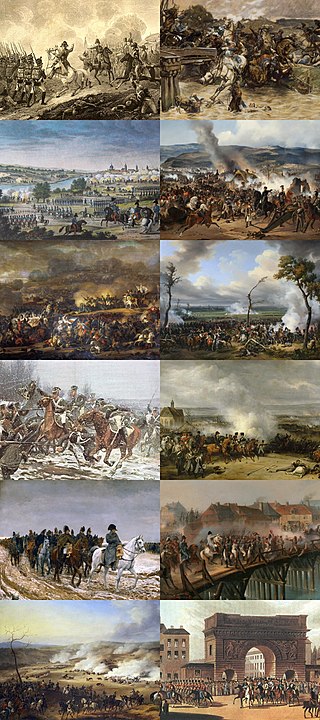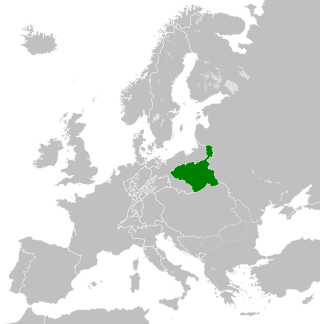Related Research Articles

The Napoleonic Wars (1803–1815) were a series of conflicts fought between the French First Republic (1803–1804) and First French Empire (1804–1815) under the First Consul and Emperor of the French Napoleon Bonaparte and a fluctuating array of European coalitions. The wars originated in political forces arising from the French Revolution (1789–1799) and from the French Revolutionary Wars (1792–1802) and produced a period of French domination over Continental Europe. The wars are categorised as seven conflicts, five named after the coalitions that fought Napoleon, plus two named for their respective theatres: the War of the Third Coalition, War of the Fourth Coalition, War of the Fifth Coalition, War of the Sixth Coalition, War of the Seventh Coalition, the Peninsular War, and the French invasion of Russia.

Frederick Augustus I was a member of the House of Wettin who reigned as the last Elector of Saxony from 1763 to 1806 and as the first King of Saxony from 1806 to 1827. He was also Duke of Warsaw from 1807 to 1815, a short-lived disputed Grand Duke of Lithuania in 1812, and a legitimate candidate to the Polish throne.

Napoleon Bonaparte, later known by his regnal name Napoleon I, was a French general and statesman who rose to prominence during the French Revolution and led a series of military campaigns across Europe during the French Revolutionary and Napoleonic Wars from 1796 to 1815. He led the French Republic as First Consul from 1799 to 1804, then ruled the French Empire as Emperor of the French from 1804 to 1814, and briefly again in 1815.

The Treaty of Paris of 1815, also known as the Second Treaty of Paris, was signed on 20 November 1815, after the defeat and the second abdication of Napoleon Bonaparte. In February, Napoleon had escaped from his exile on Elba, entered Paris on 20 March and began the Hundred Days of his restored rule. After France's defeat at the hands of the Seventh Coalition at the Battle of Waterloo, Napoleon was persuaded to abdicate again, on 22 June. King Louis XVIII, who had fled the country when Napoleon arrived in Paris, took the throne for a second time on 8 July.

The Hundred Days, also known as the War of the Seventh Coalition, marked the period between Napoleon's return from eleven months of exile on the island of Elba to Paris on 20 March 1815 and the second restoration of King Louis XVIII on 8 July 1815. This period saw the War of the Seventh Coalition, and includes the Waterloo Campaign and the Neapolitan War as well as several other minor campaigns. The phrase les Cent Jours was first used by the prefect of Paris, Gaspard, comte de Chabrol, in his speech welcoming the king back to Paris on 8 July.

The Franco-Swedish War or Pomeranian War was the first involvement by Sweden in the Napoleonic Wars. The country joined the Third Coalition in an effort to defeat France under Napoleon Bonaparte.

In the War of the Sixth Coalition, sometimes known in Germany as the Wars of Liberation, a coalition of Austria, Prussia, Russia, Spain, the United Kingdom, Portugal, Sweden, Sardinia, and a number of German States defeated France and drove Napoleon into exile on Elba. After the disastrous French invasion of Russia of 1812 in which they had been forced to support France, Prussia and Austria joined Russia, the United Kingdom, Sweden, and Portugal, and the rebels in Spain who were already at war with France.

The Duchy of Warsaw, also known as the Grand Duchy of Warsaw and Napoleonic Poland, was a French client state established by Napoleon Bonaparte in 1807, during the Napoleonic Wars. It initially comprised the ethnically Polish lands ceded to France by Prussia under the terms of the Treaties of Tilsit, and was augmented in 1809 with territory ceded by Austria in the Treaty of Schönbrunn. It was the first attempt to re-establish Poland as a sovereign state after the 18th-century partitions and covered the central and southeastern parts of present-day Poland.

The Treaties of Tilsit, also collectively known as the Peace of Tilsit, were two peace treaties signed by French Emperor Napoleon in the town of Tilsit in July 1807 in the aftermath of his victory at Friedland, at the end of the War of the Fourth Coalition. The first was signed on 7 July, between Napoleon and Russian Emperor Alexander I, when they met on a raft in the middle of the Neman river. The second was signed with Prussia on 9 July. The treaties were made at the expense of King Frederick William III of Prussia, who had already agreed to a truce on 25 June after the Grande Armée had captured Berlin and pursued him to the easternmost frontier of his realm.

The War of the Fourth Coalition was a war spanning 1806–1807 that saw a multinational coalition fight against Napoleon's French Empire, subsequently being defeated. The main coalition partners were Prussia and Russia with Saxony, Sweden, and Great Britain also contributing. Excluding Prussia, some members of the coalition had previously been fighting France as part of the Third Coalition, and there was no intervening period of general peace. On 9 October 1806, Prussia declared war on France and joined a renewed coalition, fearing the rise in French power after the defeat of Austria and establishment of the French-sponsored Confederation of the Rhine in addition to having learned of French plans to cede Prussian-desired Hanover to Britain in exchange for peace. Prussia and Russia mobilized for a fresh campaign with France, massing troops in Saxony.
The Treaty of Poznań was signed on 11 December 1806 in Poznań and ended the war between the French Empire and the Electorate of Saxony. The latter was an ally of Prussia as a member of the Fourth Coalition against France. It was defeated in the battles of Jena and Auerstedt and partially occupied by French troops. The peace treaty was negotiated, for the French, by Charles Maurice de Talleyrand. According to its terms, the electorate became the Kingdom of Saxony and annexed certain territories taken from Prussia. It was required to join the Confederation of the Rhine and pay France an indemnity of 25 million francs. It had to contribute a small contingent for the ongoing French campaign against the coalition and place 20,000 troops at French disposal in any future war. Saxony had to ceded a small amount of territory in its west to the new Kingdom of Westphalia.

The Kingdom of Westphalia was a client state of France in present-day Germany that existed from 1807 to 1813. While formally independent, it was ruled by Napoleon's brother Jérôme Bonaparte. It was named after Westphalia, but this was a misnomer since the kingdom had little territory in common with that area. The region mostly covered territory formerly known as Eastphalia.

The Free City of Danzig, sometimes referred to as the Republic of Danzig, was a semi-independent city-state established by Napoleon on 21 July 1807, during the time of the Napoleonic Wars following the capture of the city in the siege of Danzig in May. After the Congress of Vienna of 1814–1815, Danzig was re-incorporated into the Kingdom of Prussia.

The Royal Prussian Army was the principal armed force of the Kingdom of Prussia during its participation in the Napoleonic Wars.

The Principality of Erfurt was a small state in modern Thuringia, Germany, that existed from 1807 to 1814, comprising the modern city of Erfurt and the surrounding land. It was subordinate directly to Napoleon, the Emperor of the French, rather than being a part of the Confederation of the Rhine. After nearly 3 months of siege, the city fell to Prussian, Austrian and Russian forces. Having mainly been Prussian territory before the Napoleonic Wars, most of the lands were restored to Prussia by the Congress of Vienna.

The First French Empire or French Empire, also known as Napoleonic France, was the empire ruled by Napoleon Bonaparte, who established French hegemony over much of continental Europe at the beginning of the 19th century. It lasted from 18 May 1804 to 4 April 1814 and again briefly from 20 March 1815 to 7 July 1815, when Napoleon was exiled to St. Helena.

A Franco-Persian alliance or Franco-Iranian alliance was formed for a short period between the French Empire of Napoleon I and Fath Ali Shah of Iran against Russia and Great Britain between 1807 and 1809. The alliance was part of a plan to gather extra aid against Russia and by Persia's help, having another front on Russia's southern borders, namely the Caucasus region. The alliance unravelled when France finally allied with Russia and turned its focus to European campaigns.
The French indemnity was the indemnity the French Third Republic paid to the German Empire after the French defeat in the Franco-Prussian War in 1871.
The Treaty of Paris of 24 February 1812 between Napoleon I of France and Frederick William III of Prussia established a Franco-Prussian alliance directed against Russia. On 24 June, Prussia joined the French invasion of Russia. The unpopular alliance broke down when the Prussian contingent in French service signed a separate armistice, the Convention of Tauroggen, with Russia on 30 December 1812. On 17 March 1813, Frederick William declared war on France and issued his famous proclamation "To My People".

The fall of Berlin took place on 24 October 1806 when the Prussian capital of Berlin was captured by French forces in the aftermath of the Battle of Jena–Auerstedt. Berlin fell 15 days after the beginning of the war. The French Emperor Napoleon entered the city after three days, from which he issued his Berlin Decree implementing his Continental System. Large-scale plundering of Berlin took place.